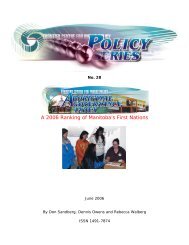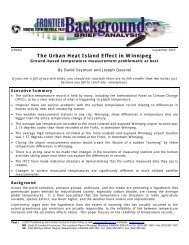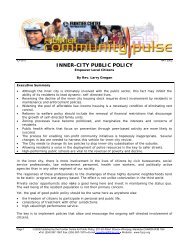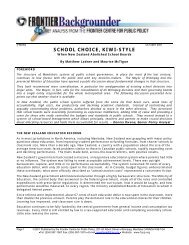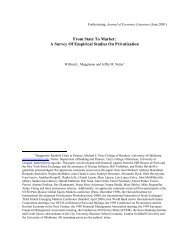View entire study as PDF - Frontier Centre for Public Policy
You also want an ePaper? Increase the reach of your titles
YUMPU automatically turns print PDFs into web optimized ePapers that Google loves.
P O L I C Y S E R I E S<br />
FCPP POLICY SERIES NO. 88 • APRIL 2010<br />
manufacturer will fill the need <strong>for</strong> jets;<br />
if not Embraer, then Bombardier; if not<br />
Airbus, then Boeing. The result is that an<br />
economic impact, jobs and tax revenues<br />
will be created somewhere, the only<br />
question is where and how: either through<br />
companies in competition with each other<br />
to deliver the products consumers think<br />
best, or through the manipulation of<br />
markets by “rent-seekers,” manipulation<br />
agreed to and promoted by governments<br />
in search of votes.<br />
The peer-reviewed camp<br />
and their conclusions about<br />
corporate welfare<br />
There is a large body of literature which<br />
punctures the notion business subsidies<br />
have much if any positive effect upon<br />
employment, on the wider economy or tax<br />
revenues. Below is a summary of a p<strong>as</strong>t<br />
review of literature enunciated elsewhere<br />
(Milke, 2007):<br />
• Timothy Bartik (1994) notes how extra<br />
job growth in one locale due to targeting<br />
comes, in part, at the expense of<br />
reduced job growth in another region.<br />
• Terry Buss (2001) notes that <strong>for</strong> subsidies<br />
to be justified and <strong>for</strong> accompanying<br />
job creation estimates to be credible,<br />
such studies would have to identify new<br />
employment, not merely employment<br />
shifted from one job site to another.<br />
• Margaret Dewar (1998) found that<br />
programs aimed at specific distressed<br />
geographic regions show “almost no<br />
effects on the growth of these are<strong>as</strong>.”<br />
• Donald Baum (1987) evaluated the<br />
effect of state and local government<br />
business incentives and subsidies on<br />
local and national economic welfare. He<br />
found that subsidies may incre<strong>as</strong>e local<br />
welfare in a single community but reduce<br />
national welfare.<br />
MONEY FOR NOTHING AND YOUR CHEQUES FOR FREE<br />
• Joe Ruggeri (2002) looked specifically at<br />
Canadian corporate welfare from 1992<br />
to 1998. He found that the distribution<br />
of federal subsidies suggested that these<br />
subsidies were not a factor in explaining<br />
different per<strong>for</strong>mances of regional<br />
economies.<br />
The short conclusion is that there is little<br />
support among peer-reviewed work <strong>for</strong><br />
business subsidies and the claims made<br />
about them. Regrettably, corporate welfare<br />
continues because it is in the interest of<br />
the actors (politicians in search of votes<br />
and companies in search of subsidies) to<br />
continue the subsidies. Problematically,<br />
while it is in the interest of a particular<br />
firm to receive $1 million or $1 billion<br />
from governments, even the latter<br />
amount equals only $30 per Canadian.<br />
Thus, even a $1 billion subsidy or loan<br />
<strong>for</strong> one company rarely causes friction<br />
with enough voters to cause a possible<br />
cancellation.<br />
“ ”<br />
...corporate welfare<br />
continues because it is in<br />
the interest of the actors<br />
(politicians, companies...)<br />
9<br />
© 2010<br />
FRONTIER CENTRE




